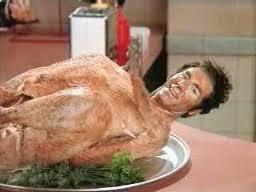Seinfeld, by Jerry Seinfeld and Larry David, Season 9, Episode 6 - "The Merv Griffin Show" with Cosmo Kramer on the lead travelling through his brand new show set, standing right in the middle of his living room. Newman co-hosting, Kramer leading the entertainment, Jerry and George pushed into the Pink-Floydy mindset turned into reality. The conversation comes to terms, Kramer asks:
- So Jeryy, ahhh... what is going on with you? I understand that there´s a young lady in your life, hummm...
Jerry immediately replies:
- Well, actually it´s kind of a funny story because she has this amazing toy collection and last night I finally got to play with them.
Kramer adds:
- Well, sounds like things are progressing. Do I hear wedding bells?
Well, I can assure you all that the answer is NO! Just because on a rush to play with those classic inherited toys, Jerry, aided by George, brings the supposed lady some turkey for dinner; both heads planning to put her to sleep so they can skip SEX (at least one of them) and instead, jump straight to the G.I. Joe business. And the weapon used is a turkey, the famous turkey tryptophan we will try to demistify right now.
Tryptophan, an essential aminoacid in the human diet (cannot be synthesized by the human organism) act as a building block in protein byosinthesis and as a precursor for compounds like serotonin (a neurotransmitter involved in the mediation of gut movements, as a cardiovascular growth factor and in the alterations of mood states in humans), for example. It is believed that turkey meat can cause drowsiness, an idea that comes from the high levels of tryptophan contained in turkey.
As I browsed the web and recent research articles are way too expensive to consult, I had to go for the good "old" knowledge lady Wikipedia. So, I learned that the ingestion of a meal rich in carbohydrates triggers the release of insulin that in turn stimulates the uptake of large neutral branched-chain amino acids (LNAA), but not tryptophan (trp) into the muscle, increasing the ratio of trp to LNAA in the blood stream. The resulting increased ratio of tryptophan to large neutral amino acids in the blood reduces competition at the large neutral amino acid transporter resulting in the uptake of tryptophan across the blood-brain barrier into the central nervous system (CNS). Once inside the CNS, tryptophan is converted into Serotonin, in the raphe nuclei, by the normal enzymatic pathway. The resultant serotonin is further metabolised into melatonin (a powerful antioxidant hormone [you can find in tomatoes] that operate also in the circadium rhythm [sleep-wake cycle]) by the pineal gland.
As stated in Wikipedia, and just for the sake of the example, I quote "Hence, these data suggest that "feast-induced drowsiness," and in particular, the common post-Christmas dinner drowsiness, ..., may be the result of a heavy meal rich in carbohydrates which, via an indirect mechanism, increases the production of sleep-promoting melatonin in the brain." End of quotation!
So, here it is, with the help of Seinfeld, the very first myth brake-down by the Toxicologist Today! Any suggestions, please feel free to contact us and opinate, as we're always looking for perfection!


No comments:
Post a Comment